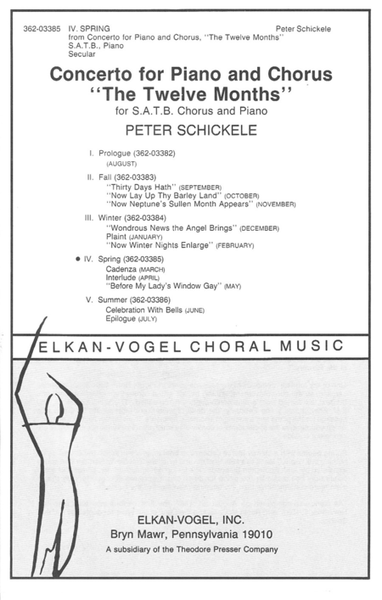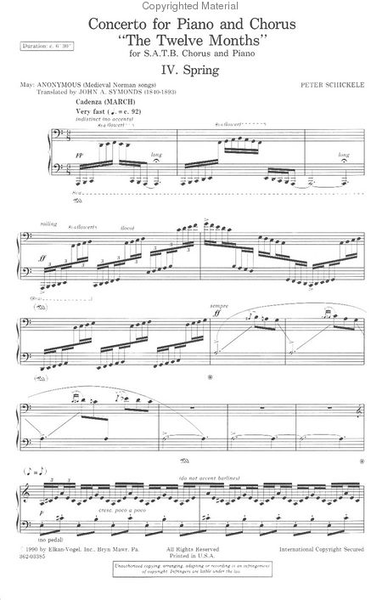Concerto For Piano And Chorus "The Twelve Months"
IV. Spring
-
Ships in 1 to 2 weeks
Details
Description
SKU: PR.362033850
IV. Spring. Composed by Peter Schickele. Sws. Elkan-Vogel Choral Music. Classical. Performance Score. With Standard notation. 24 pages. Duration 6:30. Theodore Presser Company #362-03385. Published by Theodore Presser Company (PR.362033850).ISBN 9781491100370. UPC: 680160059768. Octavo inches. English. Text: Anonymous. Anonymous.
In 1961 I wrote a piece for a cappella chorus called AFTER SPRING SUNSET, based on a group of Japanese haiku translations. It seemed to me that some of the choral writing in that piece was rather orchestral in conception, and I began to think about the idea of composing a piece for piano and chorus in which the the piano, not the chorus, was the main focus of attention - a piece in which the chorus accompanied the piano rather than the other way around. I never lost interest in the idea, but I don't like to write big works employing large forces without knowing when and by whom they're going to be performed, and the right opportunity didn't come along for years. In the early Eighties I was doing a P.D.Q. Bach concert in Tacoma, and after the concert a bunch of us went out for a bite, and the conductor of the orchestra introduced me to Richard Sparks, the conductor of the Choir of the West, and during the course of conversation I mentioned that I had always wanted to write a serious concerto for piano and chorus. I didn't think much more about it until a year or two later Mr. Sparks called and said he wanted to commission such a piece. His choir was excellent and he had lined up a fine concert pianist named Robin McCabe; the conditions for which I had been waiting a quarter of a century were finally in place. Through an informal poll among my friends I have found out that I am not the only person who regards Labor Day as the real New Year's Day; this feeling is perhaps especially strong among people who are associated with the academic or concert/theatrical world. So when I decided to make the concerto a calendar, I thought I'd start off with September; but then I thought about how September not only feels like the beginning of the year, but, after languid August, it feels like jumping into an icy river; things start happening fast, and any serene meditative feelings left over from the summer quickly become a memory. So the concerto starts with August, a quiet, flowing, wordless prologue. The second movement, Fall, uses three texts: the anonymous Thirty days hath September; a couple of verses from the October section of Thomas Tusser's sixteenth-century rhyming farm calendar; and for November, fragments of three poems: Thomas Moore's Odes of Anacreon, Shelley's Autumn. A Dirge, and William Cullen Bryant's Death of the Flowers. One of my fondest memories of my teenage years in Fargo, North Dakota is Christmas caroling, so the third movement, Winter, begins with a carol-the music is original and the text is adapted from a nineteenth-century hymn called The Wondrous Birth, by E.U. Edel; January and February, the dead of winter, are represented by a sad solo passage for the piano and a setting of Thomas Campion's Now Winter Nights Enlarge, which enumerates the social forms on conviviality which should counteract the hostile environment outside. Spring begins with a stormy March cadenza; a brief interlude in which the chorus sings nothing but April, leads to a setting of several lyrics from medieval Norman love songs translated by John Addington Symonds. The last movement, Summer, consists of some celebratory bell music by the piano for June, and a wordless epilogue for July that is even more contemplative than the opening movement of the concerto. The work was completed on August 26, 1987; the first performance took place on November 3, 1987, with Robin McCabe and the Choir of the West conducted by Richard Sparks. .
Song List (3)
- Cadenza (March)
- Interlude
- Before My Lady's Window Gay [Text by Anonymous, Translated by John A. Symonds]


 Share
Share